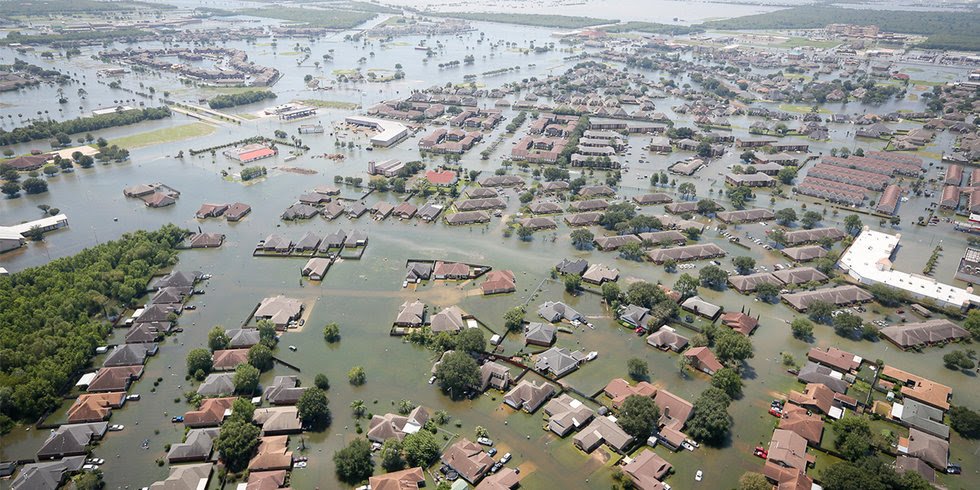|
 Flooding in Port Arthur, Texas on Aug. 31, 2017. U.S. Air National Guard photo by Staff Sgt. Daniel J. Martinez
Flooding in Port Arthur, Texas on Aug. 31, 2017. U.S. Air National Guard photo by Staff Sgt. Daniel J. Martinez
2017 Broke Records for Number of Flooded Days on U.S. Coasts
Due to the combined impacts of climate change and upcoming El Niño conditions, coastal high tide flooding in the U.S. will be up to 60 percent more frequent in 2018 than it was 20 years ago, the most recent high tide flooding report from the National Oceanic and Atmospheric Administration (NOAA), announced Wednesday, projected.
The report, NOAA's 2017 State of High Tide Flooding and 2018 Outlook, also found that the 2017 meteorological year (May 2017 - April 2018) broke records for the number of high tide flooding days nationally, for an average of six days per coastal location observed.
The report predicted that, going forward, 2018 and the years after would continue to break records due to sea level rise, and that the rate of increased flooding might accelerate. Overall, the average number of flooded days has already doubled in the past 30 years. Flooding is increasing most quickly along the Southeast Atlantic coast, up by 160 percent since 2000. Flood frequencies are also significantly increasing along the Northeast Atlantic coast, at 100 percent, and the Eastern and Western Gulf Coasts, at 50 percent.
In 2017, more than a quarter of the 98 coastal locations where NOAA measured flooding broke their individual records in 2017. Regionally, the Northeast Atlantic and Western Gulf of Mexico saw the highest number of flooded days in 2017, at a median of 11 and 12 days respectively. Cities that broke records included Boston and Atlantic City, with 22 days of flooding, Sabine Pass, Texas with 23 days of flooding and Galveston, Texas with 18 days. Records also broke along the Southeast Atlantic and Eastern Gulf, with 14 days at Bay Waveland, Mississippi and six days at Fort Myers and Cedar Key, Florida. San Diego was a regional anomaly, breaking records with 13 flooded days.
Flooding along the Northeast and in the Gulf of Mexico was influenced by an especially stormy hurricane and nor'easter season, augmented by rising sea levels. But high tide foods can also occur without storms as sea levels continue to rise.
'There's a clear upwards trend of this type of flooding,' University of Florida geologist Andrea Dutton told The Guardian in an article about the report. 'Extreme events like hurricanes may be the breaking point but this sort of frequent flooding is the taste of what is coming in the future on a permanent basis. We need to rethink our relationship with the coastline because it's going to be retreating for the foreseeable future.'
In 2018, El Niño conditions are expected to result in a higher number of flooded days than average in 48 coastal locations. The Northeast Atlantic and Northwest Pacific Coasts are expected to lead on average with five to six median days of flooding.
|

 Flooding in Port Arthur, Texas on Aug. 31, 2017. U.S. Air National Guard photo by Staff Sgt. Daniel J. Martinez
Flooding in Port Arthur, Texas on Aug. 31, 2017. U.S. Air National Guard photo by Staff Sgt. Daniel J. Martinez